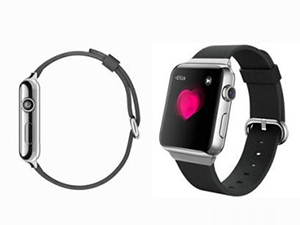Rachael Rettner, a senior writer at Live Sciences, says, “I found the Apple device works decently as a fitness tracker. It not only tracks your activity passively, but also reminds you to stand up and sends several updates each day to tell you how close you are to reaching your activity goal. It’s also the only smartwatch so far that specifically tracks the amount of time you spend standing, which seems apt, given the growing body of evidence showing the health hazards of too much sitting. Plus, you can use the watch to track your heart rate and view your workout stats, all from your wrist.”
Lauren Goode of re/code wrote, “Apple does not plan to offer any kind of observations or recommendations based on trends in your heart-rate readings — it will be up to third-party app makers to turn this data into something more valuable.”
As an example of innovation, former Google executive, Vic Gundotra, who joined AliveCor in November 2015, announced the Kardia Band, an ECG heart monitor for Apple Watch, which complements the Kardia mobile EKG, an FDA approved device that attaches to your iPhone or Android phone and captures a medical-grade EKG in just 30-seconds from anywhere, anytime. Watch how this works:
appleinsider says, “Together with a companion iOS app, the Kardia band will help wearers quickly determine whether they should seek help when they feel unusual symptoms. The results of the sensor’s analysis can be quickly e-mailed to a doctor if necessary, and users can attach voice memos to describe what they feel.” The Kardia Band hasn’t received FDA clearance yet but you can sign up with on the website to receive notices when it does.
Another innovation in health that the Apple Watch has inspired, is a patent application published that suggests Apple is working to turn the Apple Watch into a full-fledged medical device, one that can monitor a user’s vital signs and automatically send out an alert should they need urgent care. According to appleinsider, “Apple’s application for ‘Care event detection and alerts’ provides for a hardware system capable of monitoring its surrounding environment for so-called ‘care events,’ described as any event that necessitates assistance from medical personnel, police, fire rescue or other emergency technicians. For example, the device could be programmed to monitor a user’s heart for an arrhythmia and, upon detection, send out an alert to family or emergency responders.”
Whether Apple chooses to do this or a third party, the biggest issues are resources and possibly liability issues. Lance Whitney of c/net says, “The difficulties in creating a smartwatch with such features prompted people at Apple to dub the project a “black hole” as it sucked in more and more resources, one of the sources said.”
Or as appleinsider notes, “Apple has yet to position Apple Watch as a bonafide medical device, most likely due to that industry’s tight regulations. Indeed, rumors last year claimed the company scrapped plans to integrate advanced health monitoring features into Watch due in part to regulatory hurdles.”
Techcrunch lists the 22 Best Apple Watch Health And Fitness Apps.
We hope that third party developers and hardware accessories such as Alivecor’s will continue to be released so that patients can monitor their health better and send messages to appropriate parties.

